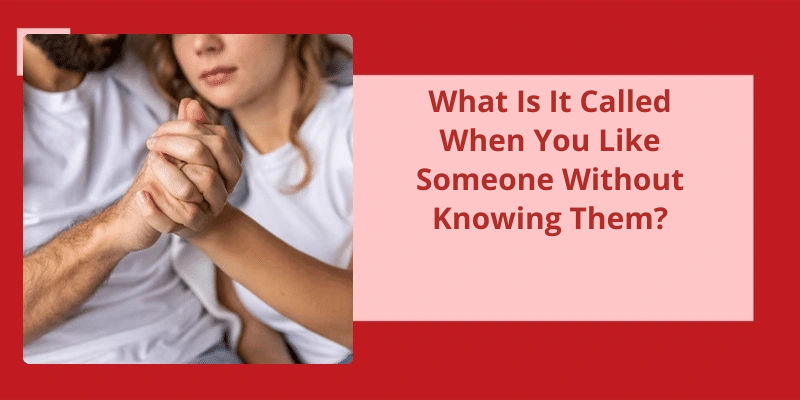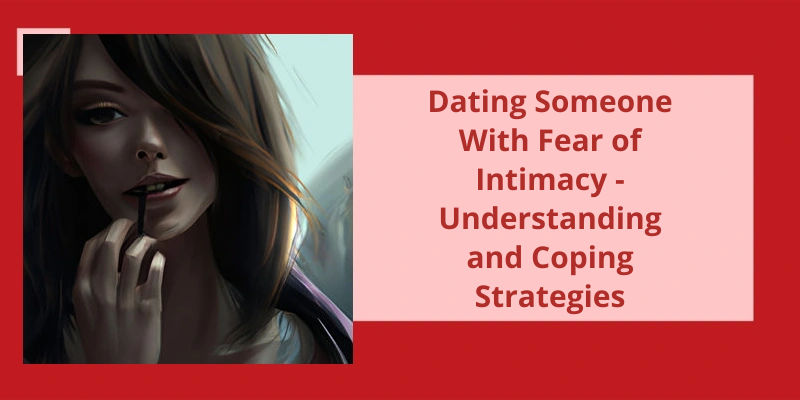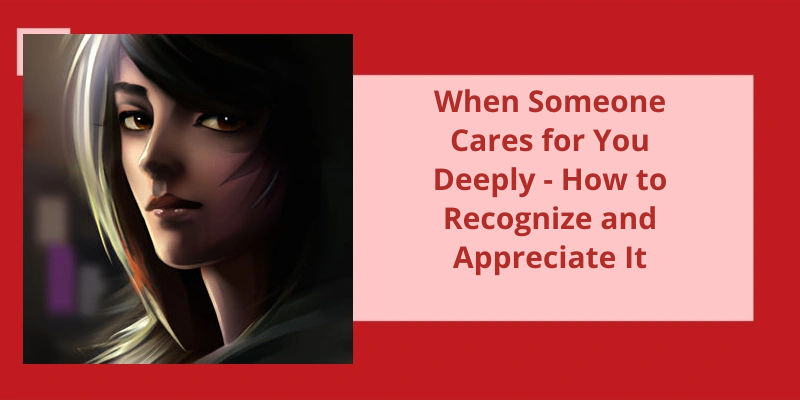It's a common phenomenon among adolescents and adults alike: feeling a strong connection to someone even before really getting to know them. It's a feeling that's often described as infatuation, a state of mind where attraction, fascination, and fixation seem to converge in a potent mixture of emotions. But what exactly does it mean to be infatuated with someone? Is it just a passing fancy or can it be the foundation for a lasting relationship? And how does our ability (or inability) to cultivate healthy sleep habits impact our capacity for forming meaningful connections with others? These are just a few of the questions that arise when contemplating the mysterious allure of infatuation and it’s role in our personal and social lives.
Is It Possible to Like Someone Without Knowing It?
It’s possible to like someone without knowing it, especially if you aren’t familiar with the feeling of attraction. When you aren’t consciously aware of your emotions, it can be difficult to identify what you’re feeling and why. It’s possible to confuse feelings of admiration, respect, and appreciation for love, leading to the belief that you don’t like someone in a romantic way.
However, emotions are complex and can manifest in various ways. You may feel drawn to someone without knowing why, and as you get to know them better, develop an attraction. This gradual shift in feelings can be subtle, making it difficult to pinpoint the exact moment you started to like someone.
In some cases, it may not be until after you’ve spent time apart from the person that you realize your true feelings. When you no longer have the opportunity to interact with them, you may find yourself missing them and yearning for their company. These emotions can be a sign that you’d developed feelings for them without realizing it at the time.
Regardless of how or when you start to like someone, the experience can be both exciting and nerve-wracking. It can be challenging to navigate these new emotions, especially if you’re unsure if the other person feels the same way. It’s important to take the time to assess your own feelings and decide what you’re comfortable with before making your feelings known.
Emotions are complex and often difficult to understand, especially when it comes to matters of the heart. Whether you realize your feelings immediately or only after some time has passed, it’s essential to take the time to consider what you want and how you feel before making any decisions.
Signs That You Are Attracted to Someone Without Realizing It.
- You find yourself thinking about them often, even when they’re not around.
- You feel nervous or excited when you see them or talk to them.
- You notice yourself trying to impress them or make them laugh.
- You may unconsciously mimic their body language or speech patterns.
- You feel happy and energized when you’re around them, but also may feel agitated or restless if they’re not available.
- You become protective of them or get jealous when they’re interacting with others.
- You may find excuses to be near them or to touch them.
As we contemplate the possibility of having feelings for someone we don’t know, it’s important to acknowledge how complex human emotions can be. While some may argue it’s impossible to feel a deep connection with a stranger, others have experienced the intensity of attraction without any prior interaction. Regardless of which side of the debate you fall on, it’s worth exploring what factors may contribute to these unexpected crushes and whether they can lead to something more meaningful.
Is It Possible to Have Feelings for Someone You Don T Know?
The notion of falling for someone we don’t know isn’t uncommon. In fact, it’s a common trope in romantic comedies and other love stories. The idea of love at first sight is romanticized in our culture, and many of us believe in it. There’s something intriguing about the idea of meeting a stranger and feeling an instant connection with them. It’s almost as if fate has brought us together.
But is it possible to have genuine feelings for someone we don’t know? The answer is yes. Our emotions can be triggered by various things – a certain look, a gesture, a voice. We can feel drawn to someone we’ve never met before and feel an intense desire to know them. It isn’t uncommon for people to fall in love with celebrities or other public figures they’ve never met.
The internet has made it easier than ever to connect with people we don’t know. Social media platforms like Twitter, Instagram, and Facebook have made it possible for us to follow the lives of complete strangers and even interact with them. It isn’t uncommon for people to develop crushes on social media influencers or other people they’ve never met. This is because social media can give us a glimpse into someones life and personality, making us feel like we know them on some level.
However, it’s important to approach these feelings with caution. It’s easy to project our desires onto someone we don’t know and create an idealized version of them in our minds. We may also be prone to misinterpreting signals and making assumptions about someones personality or interests. It’s important to take the time to get to know someone before we fully invest our emotions in them.
It’s a natural human emotion, and it can be triggered by various things. However, we must approach these feelings with caution and not get carried away by projections or assumptions. Ultimately, genuine connections are built on mutual understanding and respect, and these things can’t be rushed.
The Psychology Behind Falling for Someone We Don’t Know
- Attraction based on physical appearance or body language
- Desire for something new or different
- Projection of personal ideals onto the unknown person
- Emotional attachment to the idea of the unknown person
- Curiosity and desire for discovery
- Need for connection and intimacy
- Insecurity or dissatisfaction with current relationships
- Unconscious patterns and past experiences shaping attraction
- Chemical and hormonal reactions in the brain and body
- Cultural and societal influences on attraction and romance
Navigating the murky waters of romantic relationships can be quite confusing, especially when it comes to gauging your own feelings. As Dr. Brown explains, fear and insecurity can often cloud your judgment, making it hard to pinpoint whether or not you truly like someone. But don’t worry, there are ways to overcome this uncertainty and gain a better understanding of your emotions. Read on to discover expert tips and advice on how to navigate the complexities of liking someone.
Can You Be Confused About Liking Someone?
These fears can cloud your judgment and make it difficult to decipher your true feelings for someone. Additionally, past traumatic experiences can make it challenging to trust your own instincts and recognize genuine feelings of affection toward another person. This confusion can lead to mixed signals and misunderstandings, causing frustration and even heartache for both parties involved.
It’s important to take the time to reflect on your emotions and thoughts to determine if you truly like someone or if it’s simply a temporary infatuation. It’s normal to have doubts and reservations in the early stages of a relationship, but it’s crucial to work through those feelings rather than ignoring them or pushing them aside. Communication is key in any relationship, so being open and honest with yourself and the other person can help clear any confusion and allow for a deeper emotional connection.
Sometimes, confusion about liking someone can stem from a lack of self-confidence or self-esteem. If you don’t believe in yourself, it can be difficult to believe that someone else genuinely likes you. This can lead to self-sabotage and pushing the person away due to unwarranted fears and insecurities. It’s important to address these issues and work on building a solid foundation of self-love before pursuing a relationship with someone else.
In addition, societal and cultural norms can also play a role in confusing feelings toward someone. For example, some individuals may feel pressured to like someone because they fit a certain mold or because they feel it’s expected of them. These external pressures can make it difficult to truly assess and understand their own emotions.
However, it’s important to take the time to reflect and communicate with yourself and the other person to ensure that you’re making informed and genuine decisions about your feelings. By addressing any underlying fears or insecurities and building a solid foundation of self-confidence and self-love, individuals can develop relationships based on mutual trust, respect, and affection.
How to Differentiate Infatuation From Genuine Attraction
- Infatuation is often sudden and intense, whereas genuine attraction develops gradually and deepens over time.
- Infatuation tends to focus on the physical aspects of a person, whereas genuine attraction includes emotional, intellectual, and spiritual connection.
- Infatuation is often one-sided and based on a fantasy, whereas genuine attraction involves mutual respect, trust, and understanding.
- Infatuation is fueled by intense emotions and can lead to irrational behavior, whereas genuine attraction is grounded in reality and leads to healthy decisions and actions.
- Infatuation may fade quickly once the initial excitement wears off, whereas genuine attraction can last a lifetime and deepen with age.
Source: Why Is It Hard To Figure Out If You Like Someone Sometimes …
While it may seem like a simple phenomenon, having a crush can actually be a complex and multi-layered experience. From childhood crushes to adult attractions, understanding the psychology behind what causes us to develop strong feelings for someone is an intriguing subject. So, let’s explore the different factors that come into play when it comes to developing a crush on someone.
What Causes You to Have a Crush on Someone?
At it’s core, a crush is a perfect manifestation of the human capacity for imagination. It can be seen as a creative process where an individual constructs an idealized version of another person in their mind, with remarkable precision, based on limited information and sensory input. As a result, they perceive their object of attraction as someone who possesses a myriad of desirable traits, often overlooking flaws in a way that defies logic.
This phenomenon is often driven by a desire for fulfillment of some psychological need. Sometimes, it’s simply the need for attention and validation; other times, it’s the need for social approval, like fitting in with ones peer group. The need may also be more abstract, driven by a hope for self-realization or transcendence. Regardless of the specific needs driving the crush, the psychological processes involved in it’s development can be both fascinating and complex.
It’s worth emphasizing that crushes aren’t necessarily romantic in nature, as they can also be platonic. In the case of platonic crushes or “squishes,” people may become infatuated with someone they admire, aspire to be like, or with whom they share value systems or interests. In both romantic and platonic situations, individuals tend to focus on the things they’ve in common with their crush, leading them to construct an unreasonably idealized version of the other person.
Various factors can influence who we develop crushes on, including cultural influences, social interactions, and personality traits. In contrast, extroverted individuals may be more drawn to peoples external qualities, and therefore less likely to construct idealized versions of their crush.
The Impact of Childhood Experiences, Attachment Styles, and Past Relationships on How Individuals Form Crushes.
This topic explores how early childhood experiences, attachment styles, and past relationships can shape an individual’s tendencies toward crushes.
However, as you spend more time with them, your perceptions and opinions can change. This article will explore some of the reasons why you may suddenly like someone whom you previously didn’t enjoy being around.
Why Do I Suddenly Like Someone I Didn’t Like Before?
However, as time passed, you may have learned more about that person and discovered qualities that you admire. It’s possible that you didnt give them a fair chance before, or that they’ve gone through changes in their own life that have made them more appealing to you. Maybe you see how hard they work, or how kind they’re to others, and this has helped you to see them in a different light.
Another possible explanation for suddenly liking someone you didnt like before is that your own circumstances have changed. Perhaps youre going through a difficult time and need someone to lean on, or maybe youre feeling more positive and open to new experiences. In either case, you might find that youre drawn to someone who you previously would have dismissed.
It’s also possible that youre experiencing a shift in your values or priorities. Maybe you used to place a lot of importance on certain traits like humor or intelligence, and now youre more interested in kindness or empathy. This could change the way you see other people, making you less critical of their flaws and more appreciative of their strengths.
Another factor that can lead to sudden attraction is simply chemistry. Sometimes, two people who seem completely different on the surface just have an undeniable connection. You may not be able to explain it, but you feel drawn to that person and want to spend more time with them.
Finally, it’s worth remembering that people are complex and multifaceted. Even if you initially disliked someone, there may be many reasons why youre starting to like them now. It’s important to be open-minded and willing to give people a second chance, as you never know what you might discover about someone once you get to know them better.
The Psychology Behind Sudden Romantic Attraction
Sudden romantic attraction occurs when people feel a strong connection with someone they’ve just met. This is often due to factors such as physical attractiveness, emotional chemistry, and shared interests. However, there are also psychological factors at play, such as attachment styles and past experiences that shape how people approach relationships. Ultimately, sudden attraction is a complex phenomenon that’s influenced by many different factors.
As humans, we often find ourselves drawn to certain individuals, but is it because we truly like them or simply like the idea of being with them? The answer may not be as clear-cut as we think, as the two concepts can often be intertwined. However, one key factor that sets them apart is the amount of time it takes for our feelings to develop and evolve. Let’s delve deeper into this topic and explore the subtle nuances that differentiate liking someone from liking the idea of someone.
Is It Liking Someone or the Idea of Someone?
It all starts with the initial attraction to someone. We might see them from afar and be drawn to their looks, their personality or some unique trait that they possess. We start to fantasize about being with them, picturing all the wonderful moments we could share together. But at this point, do we truly like them or just the idea of them? It can be difficult to differentiate between the two.
As we start to spend more time with this person, we begin to learn more about them. We see their flaws and imperfections, but we also see the qualities that make them truly special. At this point, we might start to genuinely like them as a person, beyond just the idea of being with them. However, if we continue to only focus on the idea of them, we may never reach this point.
Another factor to consider is our own desires and motivations. Sometimes, we may be attracted to the idea of being with someone because of what it represents to us – perhaps we want to appear more desirable to others, or we’re seeking validation for ourselves. In these cases, we may not truly like the person for who they are, but rather what they represent to us.
It’s also important to remember that relationships aren’t static. They ebb and flow, and the feelings we’ve for someone can change over time. We may start out liking the idea of someone, but as we get to know them better, our feelings may deepen and grow beyond just that initial attraction. Alternatively, we may find that our initial attraction was just that – a passing fancy that doesn’t hold up to further scrutiny.
Ultimately, the question of whether we like someone or just the idea of them is a complex one that depends on a variety of factors. However, it’s important to remember that relationships are about more than just physical attraction or superficial qualities. To truly form a connection with someone, we need to be willing to see them for who they are, flaws and all, and to nurture a deeper appreciation for their unique qualities and personality.
How to Differentiate if You Like Someone or Just the Idea of Them.
- Do you feel happy when you’re with them or just when you think about them?
- Do you enjoy their company or just the attention they give you?
- Do you find yourself thinking about them all the time or just every now and then?
- Do you feel comfortable being yourself around them or do you feel like you’ve to put on a show?
- Do you’ve a genuine interest in their life and their interests or are you just pretending?
- Do you feel emotionally connected to them or do you just enjoy their physical presence?
- Do you see a future with them or are you just enjoying the moment?
- Do you’ve a deep respect for them as a person or do you just like the idea of them?
Conclusion
This feeling can be overwhelming and confusing, sometimes leading us to make hasty decisions or act out of character. It's important to remember that infatuation isn’t the same as love, and taking the time to get to know someone on a deeper level is crucial for the success of any relationship. While infatuation may feel intense and exciting, it's ultimately fleeting and can't sustain a long-term bond. So, rather than rushing into something based solely on initial attraction, it's vital to prioritize taking care of ourselves and getting enough restful sleep before making any major decisions about our relationships. By doing so, we can approach our romantic interests with a clearer head and a more rational perspective that allows for deeper connections and lasting love.






